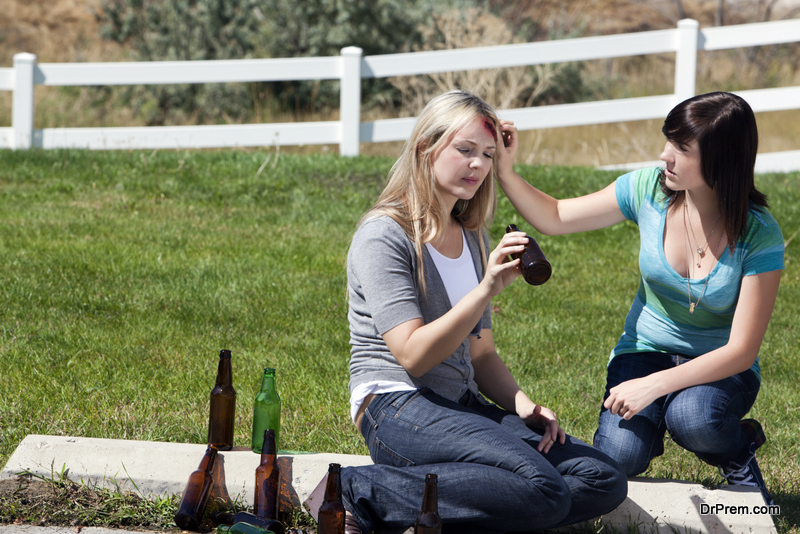You never want to see a friend in pain. But if you have a friend who is an alcoholic, you’ve seen just how damaging their addiction can be. Knowing how and when to step up can be challenging. It’s also pretty scary. Do you know what to say and do?
Signs Your Friend is an Alcoholic
Sometimes a friend’s problem with alcohol is obvious for all to see. Other times it slips under the radar and goes unnoticed until it becomes a serious issue with significant consequences. Here are some signs and symptoms that your friend is teeming on the edge of disaster:
- Frequent and continuous alcohol consumption
- Constant conversations about alcohol
- Social life that’s entirely reliant on drinking
- Facing problems at work and in personal life as a result of drinking
- Continued drinking even after everyone else stops
- Experiences withdrawals symptoms after alcohol wears off
There are plenty of other signs and symptoms, but these are the ones that tend to be most obvious to friends. If you notice one or more of these issues, it’s possible that your friend is struggling with alcohol and may need help.
5 Steps You Can Take
It’s never your responsibility to solve your friend’s problems or overcome their addiction on their behalf. You can, however, encourage them to move in a positive direction through your words and actions. In fact, research shows that strong relationships are key to recovery for addicts.
In light of this, here are a few recommendations:
1. Educate Yourself
 Before doing anything else, make sure you have a basic understanding of the situation. Learn about alcoholism, what it is, what some of the common causes are, and the various treatment options that exist. This will allow you to speak with greater authority and context.
Before doing anything else, make sure you have a basic understanding of the situation. Learn about alcoholism, what it is, what some of the common causes are, and the various treatment options that exist. This will allow you to speak with greater authority and context.
2. Practice What You’ll Say
Your words can either provide support and encouragement or they can cut your friend down and create even more serious consequences and wounds. And it’s for this reason that you need to practice what you’ll say ahead of time.
One of the best pieces of advice is to use “I” statements. When you speak in first person voice, rather than second person voice, you come across as supportive (as opposed to accusatory). This makes it more likely that your words will be taken to heart.
“Rather than saying, ‘You’re an alcoholic — you need to get help now,’ you can say, ‘I love you and you’re very important to me. I’m concerned about how much you’re drinking, and it may be harming your health,” Healthline recommends.
Subtle shifts like this can be catalytic in your efforts to breakthrough and encourage your friend to seek treatment. Practice what you’ll say and make a list of things you won’t say. Prepare for every possible response and, regardless of what else happens, prepare to remain calm, cool, and collected.
3. Offer Encouragement and Support
 It’s easy to jump down your friend’s throat and call them out for all the times they’ve hurt you, but now is not the time. View their alcoholism as the disease that it is and offer encouragement in their time of need. This will look different for everyone, but could be as simple as sitting with your friend and offering the warmth of a hug.
It’s easy to jump down your friend’s throat and call them out for all the times they’ve hurt you, but now is not the time. View their alcoholism as the disease that it is and offer encouragement in their time of need. This will look different for everyone, but could be as simple as sitting with your friend and offering the warmth of a hug.
4. Know When to Deny Support
While encouragement and support are integral, there’s also a time and place for stepping back. Never, under any circumstances, should you be an enabler. If you ever feel like you’re being taken advantage of, pull back and deny support. It may drive a temporary wedge into your relationship, but it’ll promote positive, long-term growth.
5. Stage an Intervention
 At some point, it may be necessary to stage an intervention. However, you shouldn’t do so casually. You may only get one chance at an intervention – so make it your best shot. Organize the right team, prepare ahead of time, and don’t hold anything back.
At some point, it may be necessary to stage an intervention. However, you shouldn’t do so casually. You may only get one chance at an intervention – so make it your best shot. Organize the right team, prepare ahead of time, and don’t hold anything back.
Being There for Your Friend
It’s easy to be a good friend when things are going well. It’s much more challenging to provide support, love, and encouragement when you feel like your friend is making poor decisions that negatively impact your relationship with them. However, it’s these latter circumstances that are the true test of a friendship. Will you be there for your friend when they need you most?
Article Submitted By Community Writer




